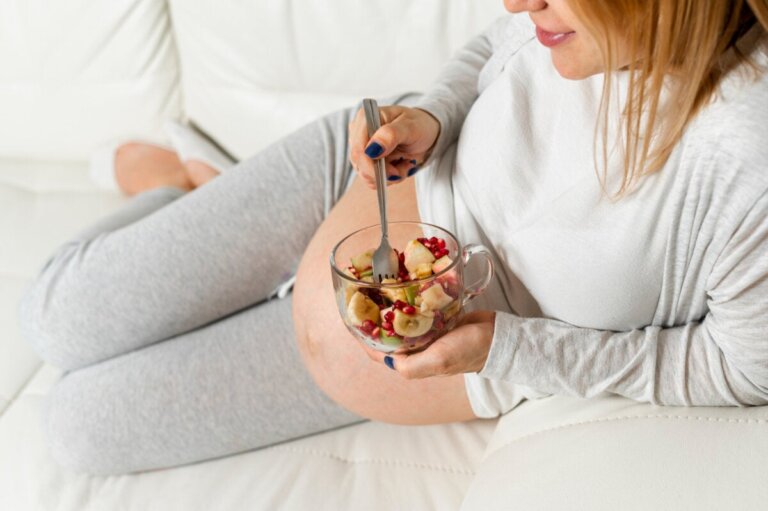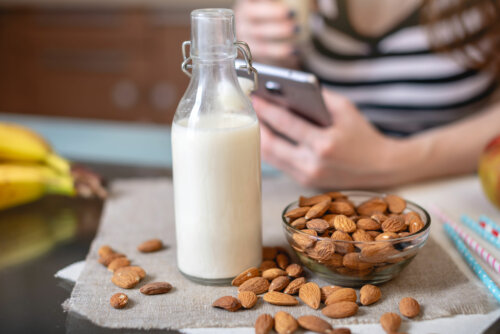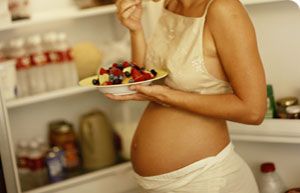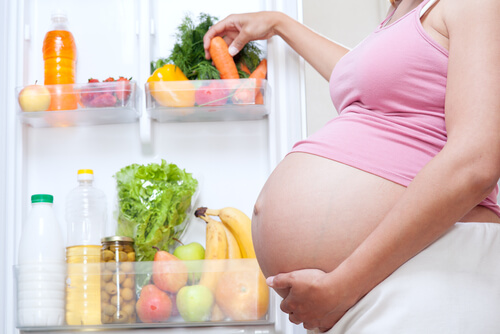Pregnancy Diet and Allergies in Babies: Can They Be Prevented?

From the time our children are in the womb, we look after their well-being at birth. Our body becomes the main supplier of nutrients and, therefore, what we eat influences their development. In this regard, there are conflicting positions on the influence of women’s diets during pregnancy on possible future allergies in babies.
Is there any relationship? How can we ensure that we provide the best protection for our little ones from the beginning? We’ll provide the answers you need to know in the following article. Keep reading!
Does diet in pregnancy prevent allergies in babies?

According to a recent review reported in the journal Frontiers in Immunology, “Over the past several decades, food allergy has emerged unexpectedly as a “second wave” of the allergy epidemic, with an increasing number of infants and children afflicted with the disease from developing and developed countries worldwide.”
So, in the search for solutions to curb this disease, the possible prevention of allergies in babies from the time they’re in the womb through early exposure to allergens through the mother emerges. But does it work? Let’s review the papers that support it and what those who don’t support this relationship have to say.
Positions against
Some researchers argue that there’s still no solid evidence to support the relationship between a woman’s diet during pregnancy and the prevention of diseases such as allergies. To better understand this position, we’ll discuss three reasons.
There’s no definitive evidence to date
Some studies have been inconsistent or inconclusive. For example, a study published in the Canadian Medical Association Journal suggests that there isn’t enough evidence to link peanut consumption during pregnancy with the prevention of peanut allergies in babies.
This is in line with a paper reported in the journal Nutrition, which also found no relationship between what the mother ate during pregnancy and her children’s allergies.
There are factors that complicate the results
Some argue that allergies are complex and multifactorial. For example, it’s difficult to see only the effect of maternal diet during pregnancy as a solution to allergies in babies without taking into account the influence of genetics, environment, and lifestyle. This is explained in the book Early Nutrition and Long-Term Health (2017).
There are potential methodological flaws
Some of the studies show variations in allergy diagnostic methods and their definitions. In addition, they’ve had limitations in the collection of data on maternal diet. This can affect the results and make comparisons between them difficult.
For example, the aforementioned paper published in Frontiers in Immunology couldn’t come to a firm conclusion about the relationship between infant allergies and pregnancy because the scientific data were inconsistent. They called for further research.
Now, what do those who’ve found positive a positive correlation between diet during pregnancy and infant allergies have to say? We’ll discuss that below.
Positive results

A study published in the journal JAMA Pediatrics noted that those mothers who consumed more nuts and peanuts during pregnancy had babies with a lower risk of allergy to these foods. However, the relationship is complex and depends on other factors, such as the type of allergy and the infant’s genotype.
A review reported in the journal Pediatric Allergy and Immunology suggests that the early introduction of allergens in a pregnant woman’s diet could desensitize her baby’s immune system, reducing allergies. However, they caution that research designs need to be improved to obtain more reliable data.
Also, more recent data such as those from the journal Allergy, Asthma & Clinical Immunology indicate that the consumption of eggs and raw and cooked vegetables during pregnancy may be preventive against asthma, wheezing, and allergic rhinitis.
They explained that it’s possible that the immunomodulatory properties of antioxidants, selenium, and vitamin E in these foods may protect against allergies.
What do we know about other nutrients?
A recent paper published in the journal Children revealed that omega-3 supplementation in pregnancy appears to protect against the development of allergies in babies. But its relationship with other nutrients in the diet needs to be studied.
This group of researchers also highlighted that the best results occur when the nutrients are consumed within a healthy diet, such as the Mediterranean diet.
Similarly, a meta-analysis reported in the journal PLOS Medicine relates the consumption of omega-3s with the prevention of allergies in infants, as well as with the use of probiotic-based supplements.
Finally, the journal Nutrients stresses the importance of eating legumes during pregnancy to protect babies from allergies. However, they recommend larger studies and randomized controlled trials.
What does the academy say?
The American Academy of Pediatrics (AAP) emphasizes that there isn’t enough evidence to suggest that food avoidance (exclusion) diets during pregnancy are able to prevent allergies in the baby.
Therefore, pregnant mothers don’t have to avoid peanuts, milk, wheat, and other food allergens. They recommend eating a balanced diet to prevent possible illnesses in the baby, especially if they suffer from any allergies.
Our perspective
We’re convinced that strategies should be sought to help solve the occurrence of food allergies in children after birth.
And although several studies show positive results between diet during pregnancy and allergy prevention in babies, most of them recommend further research and rethinking the methodology of work.
While science is engaged in further research, our position is that the mother’s eating plan during pregnancy should carry all the key nutrients for optimal development and growth of her baby.

A nutrient-packed diet
The diet will include fresh vegetables and fruits, whole grains, legumes, lean meats, fatty fish, low-fat and dairy and plant-based drinks fortified with calcium and vitamin D.
Limiting salt, solid fats, ultra-processed foods, and products with added sugar is also a priority for a healthy diet.
Our final recommendation is not to avoid allergenic foods or add more of them to the diet until solid conclusions are drawn from this relationship. Consult with your physician and nutrition professional to help you organize a healthy diet plan.
From the time our children are in the womb, we look after their well-being at birth. Our body becomes the main supplier of nutrients and, therefore, what we eat influences their development. In this regard, there are conflicting positions on the influence of women’s diets during pregnancy on possible future allergies in babies.
Is there any relationship? How can we ensure that we provide the best protection for our little ones from the beginning? We’ll provide the answers you need to know in the following article. Keep reading!
Does diet in pregnancy prevent allergies in babies?

According to a recent review reported in the journal Frontiers in Immunology, “Over the past several decades, food allergy has emerged unexpectedly as a “second wave” of the allergy epidemic, with an increasing number of infants and children afflicted with the disease from developing and developed countries worldwide.”
So, in the search for solutions to curb this disease, the possible prevention of allergies in babies from the time they’re in the womb through early exposure to allergens through the mother emerges. But does it work? Let’s review the papers that support it and what those who don’t support this relationship have to say.
Positions against
Some researchers argue that there’s still no solid evidence to support the relationship between a woman’s diet during pregnancy and the prevention of diseases such as allergies. To better understand this position, we’ll discuss three reasons.
There’s no definitive evidence to date
Some studies have been inconsistent or inconclusive. For example, a study published in the Canadian Medical Association Journal suggests that there isn’t enough evidence to link peanut consumption during pregnancy with the prevention of peanut allergies in babies.
This is in line with a paper reported in the journal Nutrition, which also found no relationship between what the mother ate during pregnancy and her children’s allergies.
There are factors that complicate the results
Some argue that allergies are complex and multifactorial. For example, it’s difficult to see only the effect of maternal diet during pregnancy as a solution to allergies in babies without taking into account the influence of genetics, environment, and lifestyle. This is explained in the book Early Nutrition and Long-Term Health (2017).
There are potential methodological flaws
Some of the studies show variations in allergy diagnostic methods and their definitions. In addition, they’ve had limitations in the collection of data on maternal diet. This can affect the results and make comparisons between them difficult.
For example, the aforementioned paper published in Frontiers in Immunology couldn’t come to a firm conclusion about the relationship between infant allergies and pregnancy because the scientific data were inconsistent. They called for further research.
Now, what do those who’ve found positive a positive correlation between diet during pregnancy and infant allergies have to say? We’ll discuss that below.
Positive results

A study published in the journal JAMA Pediatrics noted that those mothers who consumed more nuts and peanuts during pregnancy had babies with a lower risk of allergy to these foods. However, the relationship is complex and depends on other factors, such as the type of allergy and the infant’s genotype.
A review reported in the journal Pediatric Allergy and Immunology suggests that the early introduction of allergens in a pregnant woman’s diet could desensitize her baby’s immune system, reducing allergies. However, they caution that research designs need to be improved to obtain more reliable data.
Also, more recent data such as those from the journal Allergy, Asthma & Clinical Immunology indicate that the consumption of eggs and raw and cooked vegetables during pregnancy may be preventive against asthma, wheezing, and allergic rhinitis.
They explained that it’s possible that the immunomodulatory properties of antioxidants, selenium, and vitamin E in these foods may protect against allergies.
What do we know about other nutrients?
A recent paper published in the journal Children revealed that omega-3 supplementation in pregnancy appears to protect against the development of allergies in babies. But its relationship with other nutrients in the diet needs to be studied.
This group of researchers also highlighted that the best results occur when the nutrients are consumed within a healthy diet, such as the Mediterranean diet.
Similarly, a meta-analysis reported in the journal PLOS Medicine relates the consumption of omega-3s with the prevention of allergies in infants, as well as with the use of probiotic-based supplements.
Finally, the journal Nutrients stresses the importance of eating legumes during pregnancy to protect babies from allergies. However, they recommend larger studies and randomized controlled trials.
What does the academy say?
The American Academy of Pediatrics (AAP) emphasizes that there isn’t enough evidence to suggest that food avoidance (exclusion) diets during pregnancy are able to prevent allergies in the baby.
Therefore, pregnant mothers don’t have to avoid peanuts, milk, wheat, and other food allergens. They recommend eating a balanced diet to prevent possible illnesses in the baby, especially if they suffer from any allergies.
Our perspective
We’re convinced that strategies should be sought to help solve the occurrence of food allergies in children after birth.
And although several studies show positive results between diet during pregnancy and allergy prevention in babies, most of them recommend further research and rethinking the methodology of work.
While science is engaged in further research, our position is that the mother’s eating plan during pregnancy should carry all the key nutrients for optimal development and growth of her baby.

A nutrient-packed diet
The diet will include fresh vegetables and fruits, whole grains, legumes, lean meats, fatty fish, low-fat and dairy and plant-based drinks fortified with calcium and vitamin D.
Limiting salt, solid fats, ultra-processed foods, and products with added sugar is also a priority for a healthy diet.
Our final recommendation is not to avoid allergenic foods or add more of them to the diet until solid conclusions are drawn from this relationship. Consult with your physician and nutrition professional to help you organize a healthy diet plan.
All cited sources were thoroughly reviewed by our team to ensure their quality, reliability, currency, and validity. The bibliography of this article was considered reliable and of academic or scientific accuracy.
- Abrams, E. M., & Sicherer, S. H. (2018). Maternal peanut consumption and risk of peanut allergy in childhood. CMAJ, 190(27), 814–815. https://www.ncbi.nlm.nih.gov/pmc/articles/PMC6041250/
- American Academy of Pediatrics. (2019, 18 de marzo). AAP Clinical Report Highlights Early Introduction of Peanut-based Foods to Prevent Allergies. Healthy Children. https://www.healthychildren.org/English/news/Pages/Early-Introduction-of-Peanut-based-Foods-to-Prevent-Allergies.aspx
- Baïz, N., Just, J., Chastang, J., Forhan, A., de Lauzon-Guillain, B., Magnier, A. M., … & EDEN Mother-Child Cohort Study Group. (2019). Maternal diet before and during pregnancy and risk of asthma and allergic rhinitis in children. Allergy, Asthma & Clinical Immunology, 15, 1-10. https://aacijournal.biomedcentral.com/articles/10.1186/s13223-019-0353-2
- Delvert, R., Ghozal, M., Adel-Patient, K., Kadawathagedara, M., Heude, B., Charles, M. A., Annesi-Maesano, I., Tafflet, M., Leynaert, B., Varraso, R., de Lauzon-Guillain, B., & Bédard, A. (2022). Maternal Diet Quality during Pregnancy and Allergic and Respiratory Multimorbidity Clusters in Children from the EDEN Mother-Child Cohort. Nutrients, 15(1), 146. https://pubmed.ncbi.nlm.nih.gov/36615802/
- Feketea, G., Kostara, M., Bumbacea, R. S., Vassilopoulou, E., & Tsabouri, S. (2023). Vitamin D and Omega-3 (Fatty Acid) Supplementation in Pregnancy for the Primary Prevention of Food Allergy in Children-Literature Review. Children, 10(3), 468. https://www.mdpi.com/2227-9067/10/3/468
- Frazier, A. L., Camargo, C. A., Jr, Malspeis, S., Willett, W. C., & Young, M. C. (2014). Prospective study of peripregnancy consumption of peanuts or tree nuts by mothers and the risk of peanut or tree nut allergy in their offspring. JAMA Pediatrics, 168(2), 156–162. https://pubmed.ncbi.nlm.nih.gov/24366539/
- Larsen, V., Ierodiakonou, D., Jarrold, K., Cunha, S., Chivinge, J., Robinson, Z., Geoghegan, N., Ruparelia, A., Devani, P., Trivella, M., Leonardi-Bee, J., & Boyle, R. J. (2018). Diet during pregnancy and infancy and risk of allergic or autoimmune disease: A systematic review and meta-analysis. PLoS Medicine, 15(2), 100. https://pubmed.ncbi.nlm.nih.gov/29489823/
- Hogan, A. (s. f.). Ask the Allergist: Can Diet During Pregnancy Cause Allergies in My Baby?. Allergy & Asthma Network. Consultado el 28 de junio de 2023. https://allergyasthmanetwork.org/news/ask-allergist-diet-pregnancy-allergy/
- Jiao, L., Su, C. W., Cao, T., Zheng, S., Walker, W. A., & Shi, H. N. (2022). Maternal Influences and Intervention Strategies on the Development of Food Allergy in Offspring. Frontiers in Immunology, 13, 817. https://www.frontiersin.org/articles/10.3389/fimmu.2022.817062/full
- Netting, M. J., Middleton, P. F., & Makrides, M. (2014). Does maternal diet during pregnancy and lactation affect outcomes in offspring? A systematic review of food-based approaches. Nutrition, 30(11-12), 1225–1241. https://pubmed.ncbi.nlm.nih.gov/25280403/
- Palmer, D. J. (2017). Early nutrition and its effect on allergy development. In Early Nutrition and Long-Term Health, 175-201. Woodhead Publishing. https://research-repository.uwa.edu.au/en/publications/early-nutrition-and-its-effect-on-allergy-development
- Venter, C., Brown, K. R., Maslin, K., & Palmer, D. J. (2017). Maternal dietary intake in pregnancy and lactation and allergic disease outcomes in offspring. Pediatric allergy and immunology : official publication of the European Society of Pediatric Allergy and Immunology, 28(2), 135–143. https://pubmed.ncbi.nlm.nih.gov/27864894/
This text is provided for informational purposes only and does not replace consultation with a professional. If in doubt, consult your specialist.








